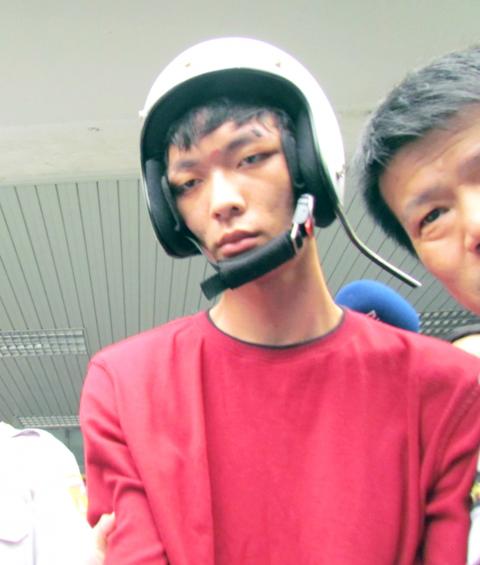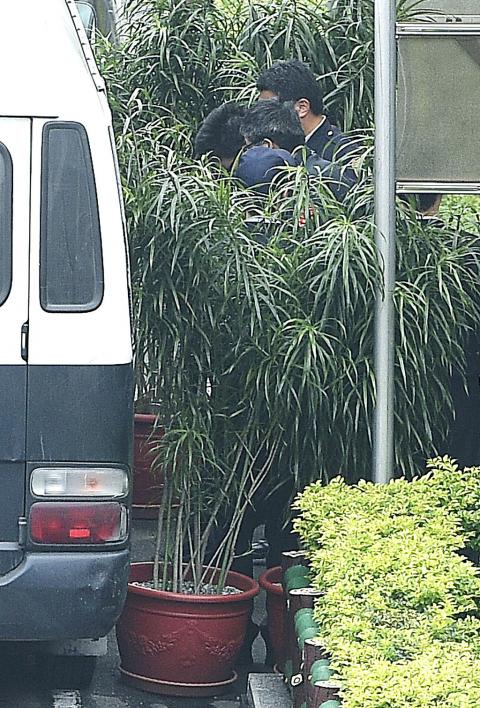The New Taipei City District Court collegiate bench yesterday found MRT killer Cheng Chieh (鄭捷) guilty on four counts of murder and 22 counts of attempted manslaughter, handing down four death sentences and prison sentences ranging from five to eight years, amounting to a total jail term of 144 years.
Cheng’s citizen’s rights have also been revoked for life.
The ruling may be appealed, the court said.

Photo: CNA
Cheng, then a student of Tunghai University, attacked passengers on Taipei’s MRT metro rail system on May 21 last year on the Bannan Line between Longshan Temple Station and Jiangzicui Station. He killed Hsieh Ching-yun (解青雲), Chang Cheng-han (張正翰), Lee Tsui-yun (李翠雲) and Pan Pi-chu (潘碧珠), and injured 22 others.
Cheng had initially said that he was tired of life, but was afraid of committing suicide, so he committed multiple counts of murder so that he would be assured of capital punishment.
The court found that Cheng did not exhibit signs of psychotic abnormalities or mental deficiencies at the time of his actions.

Photo: Chen Chih-chu, Taipei Times
Central Police University professor Shen Sheng-ang (沈勝昂) said the possibility of Cheng being rehabilitated was unlikely, adding that “Cheng’s situation is akin to that of a terminal-stage cancer patient.”
Cheng’s initial aloofness and silence, as well as his failure to apologize to the victims’ families, saw an abrupt turn on Feb. 10, when he broke his silence to say he would undergo psychiatric consultation and would not resort to violence and murder again if given the chance for parole.
According to sources, Cheng’s sudden change in attitude was due to his belief that he could accept a life sentence and perhaps make a living by starting a small business if he were to be released on parole.
One source quoted Cheng saying to his friends that “[If I] win [the case], we’ll have the chance of living our lives as we like; [if I] lose, we’ll meet in another life as heroes.”
Cheng’s lawyers sought to rationalize his attitude after the killings by saying that his thinking was like that of a teenager, believing that if he showed any regret, he would lose face.
That is why he seemed aloof, although he knew what he did was wrong, they said.
“We understand that the court is under great pressure from the media, but trying to demonize the defendant will not help society,” Cheng’s lawyers said in a statement.
His lawyers also criticized the presiding judges, saying that the court violated their client’s rights by forcing him to attend court to hear the ruling, as he was not by law mandated to be present.
“By forcing our client to appear at court simply for maximum media effect, the judges have lost focus and have endangered the equality and uniformity of the law, creating an exception that might be followed in future cases,” the lawyers said.
Meanwhile, family members of the victims said that the ruling was in accordance with the public’s expectations, but they could not condone the comments from Cheng’s lawyers.
Lee’s brother Lee Jui-chang (李瑞昌) said he was glad the New Taipei City District Court judges were just, and that he hoped judges in the appellate courts would continue to uphold the ruling.
The reasons cited by the lawyers for the murders sought to deny Cheng’s responsibility in the matter, Lee Jui-chang said, adding that he hoped the day for the final ruling on Cheng’s capital punishment could be expedited.
Additional reporting by CNA

Seventy percent of middle and elementary schools now conduct English classes entirely in English, the Ministry of Education said, as it encourages schools nationwide to adopt this practice Minister of Education (MOE) Cheng Ying-yao (鄭英耀) is scheduled to present a report on the government’s bilingual education policy to the Legislative Yuan’s Education and Culture Committee today. The report would outline strategies aimed at expanding access to education, reducing regional disparities and improving talent cultivation. Implementation of bilingual education policies has varied across local governments, occasionally drawing public criticism. For example, some schools have required teachers of non-English subjects to pass English proficiency

‘FORM OF PROTEST’: The German Institute Taipei said it was ‘shocked’ to see Nazi symbolism used in connection with political aims as it condemned the incident Sung Chien-liang (宋建樑), who led efforts to recall Democratic Progressive Party (DPP) Legislator Lee Kun-cheng (李坤城), was released on bail of NT$80,000 yesterday amid an outcry over a Nazi armband he wore to questioning the night before. Sung arrived at the New Taipei City District Prosecutors’ Office for questioning in a recall petition forgery case on Tuesday night wearing a red armband bearing a swastika, carrying a copy of Adolf Hitler’s Mein Kampf and giving a Nazi salute. Sung left the building at 1:15am without the armband and apparently covering the book with a coat. This is a serious international scandal and Chinese

TRADE: The premier pledged safeguards on ‘Made in Taiwan’ labeling, anti-dumping measures and stricter export controls to strengthen its position in trade talks Products labeled “made in Taiwan” must be genuinely made in Taiwan, Premier Cho Jung-tai (卓榮泰) said yesterday, vowing to enforce strict safeguards against “origin laundering” and initiate anti-dumping investigations to prevent China dumping its products in Taiwan. Cho made the remarks in a discussion session with representatives from industries in Kaohsiung. In response to the US government’s recent announcement of “reciprocal” tariffs on its trading partners, President William Lai (賴清德) and Cho last week began a series of consultations with industry leaders nationwide to gather feedback and address concerns. Taiwanese and US officials held a videoconference on Friday evening to discuss the

PERSONAL DATA: The implicated KMT members allegedly compiled their petitions by copying names from party lists without the consent of the people concerned Judicial authorities searched six locations yesterday and questioned six people, including one elderly Chinese Nationalist Party (KMT) member and five KMT Youth League associates, about alleged signature forgery and fraud relating to their recall efforts against two Democratic Progressive Party (DPP) legislators. After launching a probe into alleged signature forgery and related fraud in the KMT’s recall effort, prosecutors received a number of complaints, including about one petition that had 1,748 signatures of voters whose family members said they had already passed away, and also voters who said they did not approve the use of their name, Taipei Deputy Chief Prosecutor